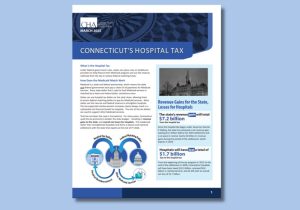On Monday, March 24, the Connecticut Hospital Association (CHA) provided testimony before the Public Health Committee on two bills concerning certificate of need (CON). CHA also testified to express serious concerns with certain proposals contained in SB 7, An Act Concerning Protections For Access To Health Care And The Equitable Delivery Of Health Care Services In The State.
CHA Continues To Advocate for Targeted Certificate of Need Reform
In testimony voicing CHA’s concerns with HB 7050, An Act Concerning The Office Of Health Strategy’s Recommendations Regarding The Certificate Of Need Program and SB 1539, An Act Concerning Certificates Of Need, as written, CHA Senior Vice President of Policy Paul Kidwell emphasized that the CON process must be reformed to ensure it is timely, equitable, efficient, and not cost-prohibitive for applicants and stakeholders. The current system, Kidwell underscored, creates barriers to healthcare access and hinders economic growth.
“While we appreciate the committee’s attention to the CON process and proposed amendments, we generally believe that the CON process needs a much larger overhaul and have ideas related to how that can be accomplished,” Kidwell said. These recommendations include but are not limited to:
- Prohibiting the Office of Health Strategy (OHS) from requiring applicants to meet requirements or obligations that are not set forth in statute or regulation
- Authorizing a committee review of the structure of the CON process, including review of the cost to healthcare providers due to delays and inefficiencies in the CON process and an examination of the CON process in other states, including, but not limited to, New York and Massachusetts
- Streamlining the CON process by not requiring a CON for the relocation of any outpatient service within the same municipality, a reduction or increase in the number of inpatient or outpatient beds by nine or fewer in a two-year cycle, the termination of inpatient or outpatient services due to insufficient patient volume or the inability to recruit or retain an adequate number of providers, or the termination of any subspecialty surgical service
- Developing an expedited CON process for the establishment, transfer, or expansion of behavioral health and substance use disorder treatment services, for the acquisition of imaging equipment, and for terminations of services
- Reducing delays by limiting requests for information, using only information in the record and available to all parties in making decisions, requiring timeliness in noticing and holding hearings, and deeming applications approved should OHS not meet statutory timeframes
Click here to learn more about CHA’s advocacy efforts to improve Connecticut’s CON process.
Click here to read CHA’s written testimony on SB 1539.
Click here to read CHA’s written testimony on HB 7050.
CHA Urges Committee To Reject Several Provisions of Omnibus Healthcare Bill
Without substantial adjustments, SB 7 would harm hospitals and hurt patients — antithetical to the bill’s intended purpose of protecting continued access to healthcare services and advancing health equity.
In his testimony, CHA Vice President of System Innovation and Financing Mark Schaefer detailed the danger of implementing Section 3 of SB 7, which would introduce an outright prohibition on commercial reimbursement for injection and infusion services provided by hospitals in off-campus settings. The majority of this care supports cancer treatment, which typically involves frequent infusion of chemotherapy or other drugs by nurses or other hospital staff pursuant to a physician order and plan of care. In other words, hospitals and the clinical staff who administer these treatments would receive no commercial payment whatsoever for providing these services, other than for the cost of the drug. Schaefer explained the measure would threaten the viability of these off-campus sites that treat all patients, regardless of their ability to pay. The provision would jeopardize all patients’ access to this critical care.
“Low-income patients on Medicaid rely on the access provided by hospitals — access that they may not otherwise be afforded in community practice settings,” Schaefer stated. “There is no public health rationale for making it illegal for hospitals to collect commercial reimbursement for these services, which would result in the elimination of these care settings entirely and access for all patients who rely on this care, regardless of payer.”
The strong opposition to this section of SB 7 was recognized by the committee, and this provision was removed from the bill advanced by the committee on Wednesday, March 26.
CHA Vice President of Advocacy Karen Buckley also outlined CHA’s opposition to Sections 4, 14, 15-18, and 28-32 as well as Sections 5-13 as written.
Buckley explained the language in Section 4 of the bill regarding Connecticut’s shield law would not accomplish its goals and could instead create significant hazards, giving a foothold to those who may place their own views and ideology above everything else, including patient choice. Sections 5-13, she said, would duplicate the federal Emergency Medical Treatment and Labor Act (EMTALA) law, a move that is both unnecessary and problematic, as passing a state-level parallel to the fully operational federal equivalent could prompt hostile litigation and additional federal scrutiny and cause confusion. In its written testimony, CHA suggests substitute language to mitigate potential risk. Additionally, Sections 15-18 would repeal a statutory framework that helps retain patient access to their provider when the provider transfers ownership of their practice. Lastly, Sections 28-32 would task the Department of Public Health (DPH) with establishing an impracticable licensure system for myriad non-clinical hospital positions despite existing extensive qualification requirements, precipitating a workforce crisis.
“The entirety of hospital-related healthcare would come to a screeching halt upon implementation because the proposal imposes unworkable pre-conditions for hundreds if not thousands of disparate hospital-based professionals who currently serve in managerial roles with a level of oversight for clinical staff at every hospital in the state,” Buckley stressed.
In the bill advanced by the committee, a provision related to stop-loss policies, also opposed by CHA, was removed from the bill language.
Click here to read CHA’s written testimony on SB 7.




